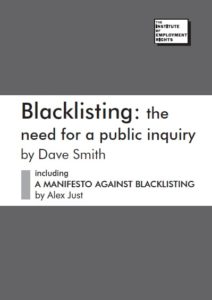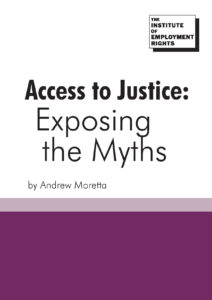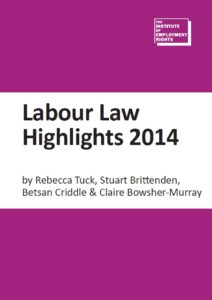
An easy guide to Access to Justice
How workers' access to justice has been weakened since 2010.
Access to justice is a human right, but one that has been threatened by successive changes to the law.
The IER’s Easy Guide to Access to Justice tracks the weakening of workers’ access to justice since 2010, including the government’s unlawful imposition of tribunal fees.
Legislative reforms - a timeline
-
January 2011 - Resolving Workplace Disputes: a consultation
Department for Business, Innovation and Skills launches “Resolving workplace disputes: A consultation” to reform employment law. The stated aim is to make the UK the “best place to start and grow a business”. In reality this is a euphemism for making it a worse place to be a worker, and making justice even more unattainable in employment disputes.
-
April 2011 - Qualifying period for unfair dismissal extended from one year to two
“Resolving workplace disputes: a consultation” results in the qualifying period for unfair dismissal being extended from one year to two, and the “intention to undertake a fundamental review of the current procedure rules for employment tribunals”.
-
October 2011 - the Beecroft Report
The government seeks the advice of Wonga CEO, right-wing lobbyist and Conservative Party donor Adrien Beecroft. Unsurprisingly, The Beecroft Report recommends the destruction of the protective function of employment law, particularly the Employment Tribunal system which it brands ‘expensive, time consuming and personally stressful’.
Key recommendations from Beecroft’s report include:
- No-fault dismissal – allowing employers with under 10 workers to fire their workers for no reason at all in exchange for compensation.
- Extend the qualifying period for unfair dismissal protection from one year to two – allowing employers to dismiss their workers with no reason for the first two years of their service without compensation.
- Remove third-party harassment protections – rescinding provisions of the Equality Act 2010 that put a duty on employers to protect their workers against harassment by third parties – such as customers and contractors – at work.
- Tribunal fees – workers seeking justice against employers they believe to have breached employment law should be charged for the right to do so.
- Compensation should be capped – the amount of compensation a worker is entitled to for discriminatory dismissal should be capped instead of covering the loss of earnings suffered by the worker.
- Small businesses should be allowed to opt-out of employment law – permitting them the choice to drop unfair dismissal, pension auto-enrolment, right to request flexible working (other than for parents and carers), flexible parental leave, licensing for employers of children, Gangmaster licensing (for the prevention of modern slavery) or equal pay audits.
- Weakening TUPE and collective redundancy laws
- Equal pay audits should not be required for businesses that lose an equal pay case
- Repeal the Gangmasters’ Licensing Act and Gangmasters’ Licensing Authority – the legislation and enforcement mechanism to prevent modern slavery, which was set up after the tragic deaths of shellfish workers in Morecambe.
- Close the Employment Agency Standards Inspectorate – which exists to tackle the exploitation of agency workers
- Avoid the Agency Workers Directive – an EU Directive that aims to prevent the exploitation of agency workers.
The majority of the recommendations have since been implemented.
-
March 2012 - BIS consults on no-fault dismissal
The Department for Business, Innovation and Skills launches a consultation on “no-fault dismissal” as recommended by Beecroft – a proposal to allow businesses with under 10 employees to dismiss workers without giving a reason.
-
April 2012 - Tribunal deposits are doubled
The maximum amount a Judge can order a party to pay as a deposit for proceeding with a case is increased from £500 to £1,000.
-
April 2012 - Unfair dismissal cases will be tried by a bare-bones panel
Unfair dismissal cases will be heard by an Employment Judge sitting alone, unless a Judge decides otherwise, rather than by a full tribunal with an employer and employee representative.
-
21 May 2012 - Beecroft report finally published
The Beecroft report is finally made publicly available by Vince Cable after the government comes under fire for its “no-fault dismissal” plans.
-
June 2012 - The Enterprise and Regulatory Reform Bill enters Parliament
The Enterprise and Regulatory Reform Bill 2013 (ERRA), the vehicle for many of Beecroft’s reforms, enters Parliament.
-
19 June 2012 – No-fault dismissal is abandoned
The government u-turns on its no-fault dismissal plans after they receive almost no support from small businesses, with both the Chambers of Commerce and the Confederation of British Industry opposing the proposals.
-
April 2013 – Collective redundancy consultation period halved.
The minimum consultation period for negotiations between unions and employers aimed at reducing the number of redundancies by looking for alternative solutions was halved from 90 days to 45 days.
-
25 April 2013 – Enterprise and Regulatory Reform Act 2013 gains royal assent.
The following changes are made to the law:
- Claims for breaches of health and safety requirements at work were restricted by shifting the burden of proof back on the worker.
- The last of the Wage Councils, the Agricultural Wages Board was abolished.
- Employment Tribunals were given the power to require deposit orders in relation to specific allegations.
- The qualifying period for unfair dismissal claims on grounds of political opinion was abolished.
- The maximum award for unfair dismissal was capped at one year’s gross pay for those earning less than £74,200 each year (in 2017 this cap is now £80,000).
Whistleblowing
- Whistle blowing protections were narrowed to encompass only matters of ‘public interest. (In Parkins v Sodexho [2001] IRLR 109 the EAT held that a dismissal made following an employee’s complaints about breaches of their employment contract fell within the ambit of the 1998 Act.)
- The Act deprived employees relying on the disclosure of information not considered to be matters of public interest in employment claims of ‘whistle blower’ status and gave tribunals the right to reduce awards by up to 25% where it was considered that there was an element of ‘bad faith’ behind the disclosure, and made it possible in certain circumstances for co-workers to be personally liable for whatever wrong had caused the complainant to make the disclosure in question.
- ERA 1996 whistle blowing was, however, extended beyond employees to embrace ‘workers’.
No fault’ dismissal
- Proposals for ‘no fault’ dismissals introduced the concept of ‘settlement agreements,’ effectively providing legislative recognition of the long standing practice of giving ‘redundancy’ payments to workers who have essentially been sacked, payments usually made with a view to reducing the likelihood of the dismissed worker bringing a claim for unfair dismissal.
- The concept of ‘without prejudice’ negotiations has been widened, building on the existing compromise agreement framework, permitting arrangements for a worker to waive the right to bring a claim in return for a payment.
Employee shareholder’
- The Act introduced the much trialed concept of the ‘employee shareholder’, allowing existing employees to sign away rights to redundancy payments, unfair dismissal, the right to request flexible working and certain maternity rights, in return for a share in the company.
- However, employees who become ‘employee shareholders’ would still have the right to bring claims if they believe they have been dismissed for an automatically unfair or discriminatory reason.
Harassment
- The Act removed the right to make ‘third –party harassment’ claims – employers have ceased to be vicariously liable in such circumstances for the actions of their customers and suppliers – and abandoned the discrimination questionnaires introduced in 2010.
Changes to Employment Tribunals
- The Act introduced Acas ‘Early Conciliation,’ which was to be implemented in 2014, and empowers tribunals to impose financial penalties upon employers who were unsuccessful at tribunal – a sum equivalent to up to half the compensation awarded the claimant, between £100 and £5,000. The money goes to the Exchequer the intention being to discourage employers from breaching those rights and reduce claims, rather than compensate.
- It also gave tribunals the discretion to require that respondents undertake ‘equal pay audits’ on losing an equal pay case – a measure implemented in 2014.
- The Act permits a single judge to hear certain EAT cases, and gave the government the power to permit Legal Officers to hear claims ‘subject to the affirmative resolution of Parliament’.
-
July 2013 - Unfair dismissal compensatory award reduced by two-thirds
The coalition will reduce the maximum unfair dismissal compensatory award by two-thirds, from the present £72,300 to either £26,000 or the workers annual salary – whichever is lower. Although the maximum compensation is very rarely awarded, this will lower compensatory awards across the board (ERRA).
-
25 June 2013 - Whistleblowers made to pass harder tests in order to report employer malpractice
Legislation making it harder for employees to blow the whistle on employer malpractice comes into effect.
Whistleblowers must now prove their information is in the ‘public interest’ and that it falls into one of the six categories of public disclosure accepted by the law: information relating to a criminal offence, a breach of legal obligation, a miscarriage of justice, risk to the health and safety of an individual, damage to the environment, or the deliberate concealment of information.
-
July 2013 – Employment Tribunal fees are introduced.
Employees now face fees of up to £1,250 to bring their employer to tribunal.
-
July 2013 – All employment cases will be tried by a bare-bones panel
The worker and employer representatives at an employment tribunal have been dispensed with, meaning the judge now sits alone.
-
July 2013 – “Protected Conversations” come into force.
An employer will be able to offer to pay an employee to leave. The employee won’t be able to use anything said in the discussion as evidence in any unfair dismissal claim – the ‘protection’ is for the employer, who will not have to go through a formal process, not the employee.
-
01 September 2013 – “Employee Shareholder” employment status is introduced.
An employee can give up their unfair dismissal rights, their right to redundancy pay and flexible working and time off for training or study in exchange for shares in a company.
-
6 May 2014 – Acas Early Concilliation, becomes a legal requirement, and all claims lodged will first go through Acas.
Tribunal claims will not be accepted unless the complaint has been referred to Acas and a conciliation certificate issued (ERRA). No additional funding is given to Acas.
-
26 July 2017 - Supreme Court finds Tribunal Fees unlawful
After a long campaign by Unison, tribunal fees are found unlawful by the Supreme Court.
The government is forced to repay up to £32m to claimants.















Thin end of the wedge? The Government’s reintroduction of Employment Tribunal fees